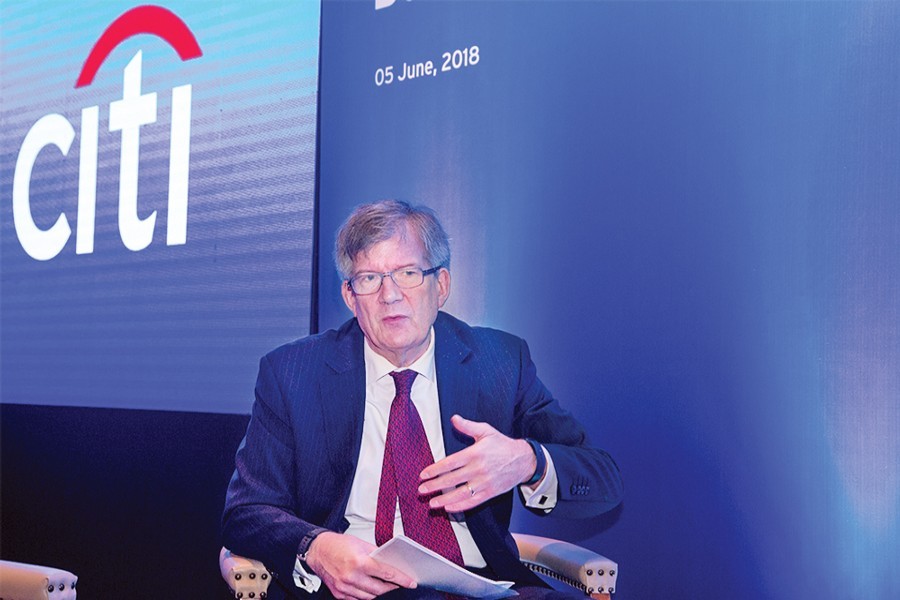Bangladesh needs to ensure an adequate supply of long-term funding to benefit from China's 'Belt and Road' projects.
A top official of a global financial giant said this in an exclusive interview with the FE recently.
For this, Bangladesh should strengthen its financial as well as capital market, said James Morrow, sub-cluster head of Citibank N.A. for Bangladesh and Sri Lanka.
"In the future, I would expect to see further development and strengthening of the financial market in Bangladesh," he hoped.
Mr Morrow, who was in Dhaka last week to attend a Belt and Road Initiative (BRI) Forum, made the observations.
One of the issues discussed at our BRI Forum was on how to ensure an adequate supply of long-term funding as many projects are long term in nature, he said.
"And that can be facilitated by further development of the financial market, including the capital market," indicated the Citibank high official.
First initiated by Chinese President Xi Jinping, the BRI is a development strategy that focuses on connectivity and cooperation between Eurasian nations.
Bangladesh formally joined the BRI in late 2016 during Xi's visit to Dhaka.
A recent report by Tokyo-based Nomura said Bangladesh is set to receive $38 billion investment through the BRI.
This equals to 15 per cent of the country's total GDP (gross domestic product) in 2017, the think tank added.
Mr Morrow said his bank is perfectly positioned to contribute to the success of the BRI projects.
"As the BRI is a large, ambitious and cross-border strategy, it fits Citibank's strategy very well."
"Out of more than 60 countries that are part of Belt and Road Initiative, we're operating in 58 countries," cited the Citibank official.
"So, we feel that there is a lot that we can contribute through leveraging our operations in those 58 countries," he added.
"Bangladesh has a very good trade and investment relationship with China. And Citibank has a strong presence in both the countries," he mentioned.
Citibank in China has quite good relations with many Chinese entities involved with the BRI, he said.
"Here in Bangladesh, we're involved with many companies that are interested to participate in the BRI schemes."
Mr Morrow observed that Citibank's bold presence in both Bangladesh and China makes it an ideal partner for Belt and Road projects in Bangladesh.
He said Bangladesh can attract foreign investment in multiple sectors through the BRI.
"I think sectors like power, infrastructure, transportation and logistics will attract a lot of investment through the BRI," he mentioned.
"There is also scope for Bangladesh to attract more Chinese investment in its Special Economic Zones and Export Processing Zones," he went on saying.
"Currently, Bangladesh is the second-largest exporter of readymade garments in the world and much of its RMG exports go to Europe and the US," the Citi banker said.
"China can also be a very good potential market for Bangladeshi RMG as well in the future," he hinted.
Globally, there are concerns that BRI could result in increased debt burden for some countries.
But Mr Morrow thinks Bangladesh's strong economic fundamentals mean there is room for funding the BRI projects.
"There may be some risks but Bangladesh's fundamentals are very strong," he said.
"It is not an economy that has too much foreign borrowing. The government's economic management has also been quite good."
Mr Morrow stressed the need for continued investment in BRI projects for reaping long-term benefits.
"I think BRI is more of an opportunity than a challenge," he observed.
"But obviously, many projects coming under BRI will be large and they will stretch for many years. Therefore, they will require continuous investment," he added.
Headquartered in New York, Citibank N.A. is present in more than 100 countries across the world.
The multinational bank started its journey in Bangladesh in 1987.
Its clientele includes multinationals, local corporate houses, financial institutions and the public sector.
The bank's commercial services include cash management, trade services, agency and trust, and direct custody and clearing solutions, as well as FX and lending.


